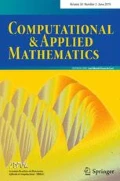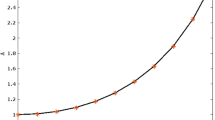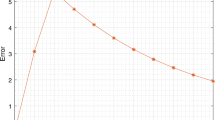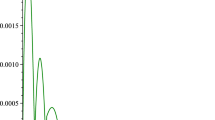Abstract
In this paper, we investigate highly stable multistep Runge–Kutta methods for Volterra integral equations. First, the order conditions for order p and stage order \(q=p\) are presented, and a convergence theorem is given. The numerical stability conditions for the basic and convolution test equations are derived. Then, the methods with one or two stages are studied in detail. Some A-stable and \(V_0\)-stable m-stage methods with order \(p>m\) are obtained. For one-stage methods, we also construct \(A_0\)-stable and  -stable methods of orders 3 and 4. Finally, numerical experiments are given to confirm the theoretical results.
-stable methods of orders 3 and 4. Finally, numerical experiments are given to confirm the theoretical results.







Similar content being viewed by others
References
Abdi A (2019) General linear methods with large stability regions for Volterra integral equations. Comput. Appl. Math. 38(2):52, 16
Baker CTH, Keech MS (1978) Stability regions in the numerical treatment of Volterra integral equations. SIAM J. Numer. Anal. 15(2):394–417
Bellen A, Jackiewicz Z, Vermiglio R, Zennaro M (1989) Natural continuous extensions of Runge–Kutta methods for Volterra integral equations of the second kind and their applications. Math. Comp. 52(185):49–63
Bellen A, Jackiewicz Z, Vermiglio R, Zennaro M (1990) Stability analysis of Runge-Kutta methods for Volterra integral equations of the second kind. IMA J. Numer. Anal. 10(1):103–118
Brunner H (2004) Collocation methods for Volterra integral and related functional differential equations. Cambridge University Press, Cambridge
Brunner H, Hairer E, Nørsett SP (1982) Runge–Kutta theory for Volterra integral equations of the second kind. Math. Comp. 39(159):147–163
Brunner H, Nørsett SP, Wolkenfelt PH (1980) On \(V_{0}\)-stability of numerical methods for Volterra integral equations of the second kind. Afdeling Numerieke Wiskunde [Department of Numerical Mathematics], 84. Mathematisch Centrum, Amsterdam
Butcher JC (2008) Numerical methods for ordinary differential equations, 2nd edn. Wiley, Chichester
Chen Y, Li X, Tang T (2013) A note on Jacobi spectral-collocation methods for weakly singular Volterra integral equations with smooth solutions. J. Comput. Math. 31(1):47–56
Conte D, D’Ambrosio R, Izzo G, Jackiewicz Z (2014) Natural Volterra Runge–Kutta methods. Numer. Algorithms 65(3):421–445
Conte D, Jackiewicz Z, Paternoster B (2008) Two-step almost collocation methods for Volterra integral equations. Appl. Math. Comput. 204(2):839–853
Conte D, Paternoster B (2009) Multistep collocation methods for Volterra integral equations. Appl. Numer. Math. 59(8):1721–1736
Fazeli S, Hojjati G, Shahmorad S (2012) Super implicit multistep collocation methods for nonlinear Volterra integral equations. Math. Comput. Modelling 55(3–4):590–607
Garrappa R (2010) Order conditions for Volterra Runge–Kutta methods. Appl. Numer. Math. 60(5):561–573
Hairer E, Lubich C, Nørsett SP (1983) Order of convergence of one-step methods for Volterra integral equations of the second kind. SIAM J. Numer. Anal. 20(3):569–579
Hosseini SA, Abdi A (2016) On the numerical stability of the linear barycentric rational quadrature method for Volterra integral equations. Appl. Numer. Math. 100:1–13
Izzo G, Jackiewicz Z, Messina E, Vecchio A (2010) General linear methods for Volterra integral equations. J. Comput. Appl. Math. 234(9):2768–2782
Izzo G, Russo E, Chiapparelli C (2012) Highly stable Runge–Kutta methods for Volterra integral equations. Appl. Numer. Math. 62(8):1002–1013
Jackiewicz Z (2009) General linear methods for ordinary differential equations. Wiley, Hoboken
Lambert JD (1973) Computational methods in ordinary differential equations. Wiley, London-New York-Sydney
Li M, Huang C (2019) The linear barycentric rational quadrature method for auto-convolution Volterra integral equations. J. Sci. Comput. 78(1):549–564
Li M, Huang C, Ming W (2019) Barycentric rational collocation methods for Volterra integral equations with weakly singular kernels. Comput. Appl. Math. 38(3):120, 15
Li Y, Yang Z, Zhang C (2019) Theoretical and numerical analysis of third-kind auto-convolution Volterra integral equations. Comput. Appl. Math. 38(4):170, 17
Liang H, Brunner H (2019) The convergence of collocation solutions in continuous piecewise polynomial spaces for weakly singular Volterra integral equations. SIAM J. Numer. Anal. 57(4):1875–1896
Linz P (1985) Analytical and numerical methods for Volterra equations. SIAM, Philadelphia
Zhang L, Ma F (2015) Pouzet–Runge–Kutta-Chebyshev method for Volterra integral equations of the second kind. J. Comput. Appl. Math. 288:323–331
Zhang R, Liang H, Brunner H (2016) Analysis of collocation methods for generalized auto-convolution Volterra integral equations. SIAM J. Numer. Anal. 54(2):899–920
Zhao J, Long T, Xu Y (2019) Multistep collocation methods for Volterra integral equations with weakly singular kernels. East Asian J. Appl. Math. 9(1):67–86
Zhao J, Long T, Xu Y (2019) Super implicit multistep collocation methods for weakly singular Volterra integral equations. Numer. Math. Theory Methods Appl. 12(4):1039–1065
Acknowledgements
The authors are very grateful to the anonymous referees and the editors for their valuable suggestions and comments.
Author information
Authors and Affiliations
Corresponding author
Ethics declarations
Funding information
This work was supported by National Natural Science Foundation of China (Nos. 11771163, 12011530058 and 12071403).
Additional information
Communicated by Hui Liang.
Publisher's Note
Springer Nature remains neutral with regard to jurisdictional claims in published maps and institutional affiliations.
Rights and permissions
About this article
Cite this article
Wen, J., Xiao, A. & Huang, C. Highly stable multistep Runge–Kutta methods for Volterra integral equations. Comp. Appl. Math. 39, 308 (2020). https://doi.org/10.1007/s40314-020-01351-z
Received:
Revised:
Accepted:
Published:
DOI: https://doi.org/10.1007/s40314-020-01351-z




